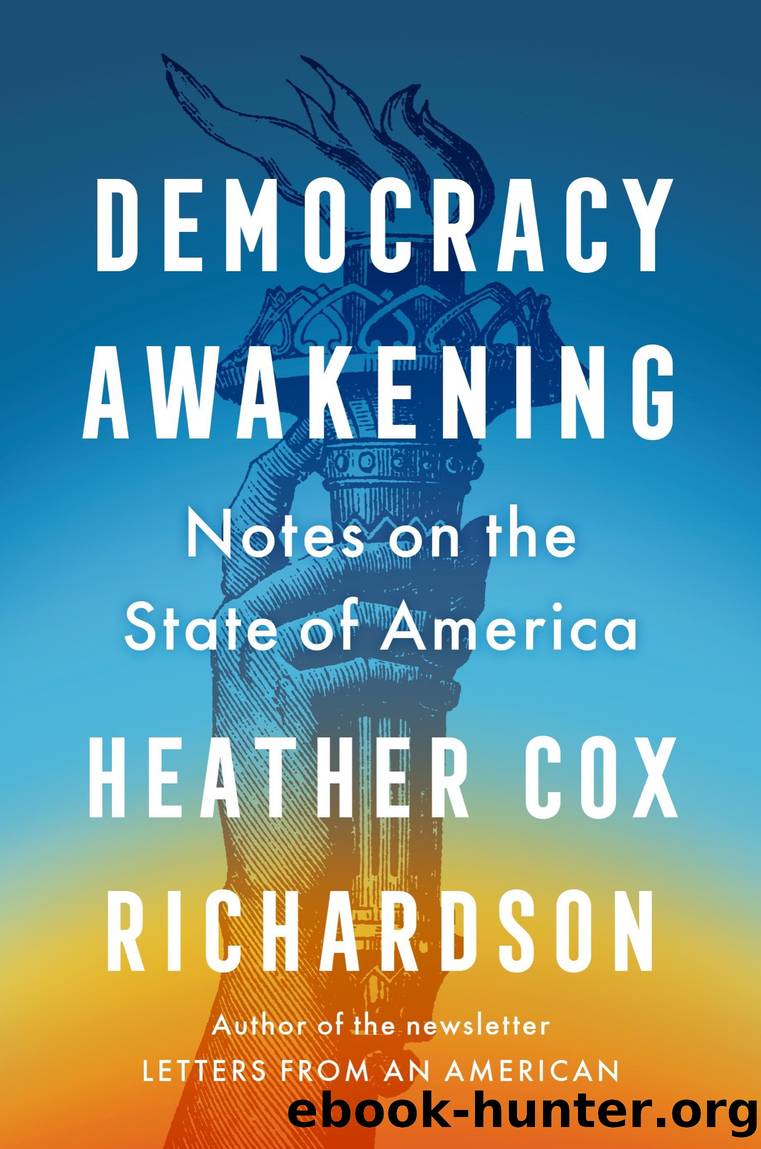Democracy Awakening by Heather Cox Richardson

Author:Heather Cox Richardson [Richardson, Heather Cox]
Language: eng
Format: epub
Publisher: Penguin Publishing Group
Published: 2023-09-26T00:00:00+00:00
CHAPTER 22
Declaring Independence
Far from being part of a divine plan, the idea of American democracy emerged from the peculiar circumstances of thirteen of the eighteen British-governed colonies in North America in the years between 1763 and 1776. The desperate attempts of the British government to raise money to pay for the Seven Yearsâ War convinced a motley group of colonists that they could create a new nation based on an idea: that men were entitled to have a say in their government.
It was not an easy sell.
In 1763, in the aftermath of what was known in the colonies as the French and Indian War, British colonists were quite content with their position in the British empire. They liked the steady hand of the kingâs officials. It brought order to the colonies, which were governed by England but were neither English nor orderly.[1]
The population of the British North American colonies came from Ireland, Scotland, Germany, Switzerland, Sweden, Spain, the continent of Africa, the Caribbean, and of course North America itself. The people were split by language, culture, and religion: in addition to Protestants, not only did Jews and Catholics put down roots in early America, but Muslims, hailing from Africa, were among the earliest settlers, and Indigenous Americans practiced their own religions.
Colonists were divided by legal status, too. By 1763, mostâthough not allâBlack Americans were enslaved to their white neighbors, and while Indigenous Americans lived throughout the colonies, they usually did not share the same legal protections as whites. Women and children were legally considered the property of their husbands or fathers. And yet the colonial economy depended on Black, Indigenous, and womenâs labor.
Even colonists who shared racial or ethnic identities didnât much trust one another. Those wealthier folks who lived in settled communities on the coastline thought the poorer folks who had moved west to find land on the frontier were lawless, profane, uncultured, uneducated, and overly religious; westerners returned the favor by thinking easterners were snooty money-grubbers who deliberately left their western countrymen to the mercies of violent gangs and the Indigenous Americans who wanted no part of those moving onto their lands.
Neither did those in the rural areas trust those in the bigger towns, which clustered around seaports and contained newcomers from all over the globe, with their new ideas, new economies, new pastimes . . . and new diseases. Cities were places of great excitement, ferment, and possibility, but they were also places of great danger, as well as places of social stratification, where wealthy men jostled against sailors and sex workers.
In 1763, it seemed the only thing holding this mess of humanity together was the strength of the British crown, and colonials were happy to rely on it.
Immediately after the Seven Yearsâ War, that reliance on British power seemed to be a good call. British authorities had turned the war in Europe over to mercenaries and focused on the North American colonies. They had supplied the armies locally, creating an economic boom, while colonists fought in every major engagement, strengthening their ties to the Crown.
Download
This site does not store any files on its server. We only index and link to content provided by other sites. Please contact the content providers to delete copyright contents if any and email us, we'll remove relevant links or contents immediately.
The Secret History by Donna Tartt(16664)
The Social Justice Warrior Handbook by Lisa De Pasquale(11494)
Thirteen Reasons Why by Jay Asher(7803)
This Is How You Lose Her by Junot Diaz(5800)
Weapons of Math Destruction by Cathy O'Neil(5048)
Zero to One by Peter Thiel(4836)
The Myth of the Strong Leader by Archie Brown(4796)
Promise Me, Dad by Joe Biden(4459)
Beartown by Fredrik Backman(4435)
Stone's Rules by Roger Stone(4423)
How Democracies Die by Steven Levitsky & Daniel Ziblatt(4415)
The Fire Next Time by James Baldwin(4352)
100 Deadly Skills by Clint Emerson(4086)
A Higher Loyalty: Truth, Lies, and Leadership by James Comey(4041)
Rise and Kill First by Ronen Bergman(4022)
The David Icke Guide to the Global Conspiracy (and how to end it) by David Icke(3892)
The Farm by Tom Rob Smith(3878)
Secrecy World by Jake Bernstein(3790)
The Doomsday Machine by Daniel Ellsberg(3738)
